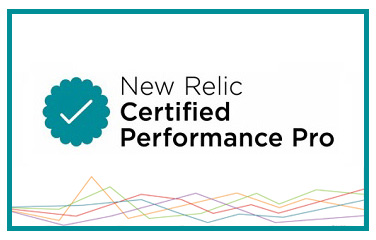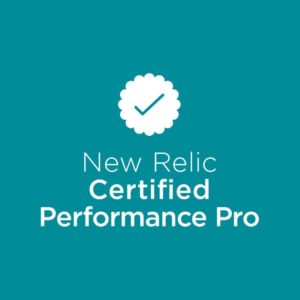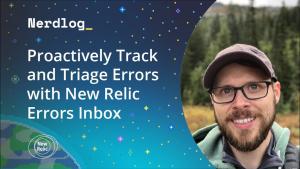Certifications have been prime resume fodder for IT operations professionals at least since SCO Unix certifications in the 1980s. Today, in the fast-paced world of DevOps and cloud computing, having an appropriate certification on your profile demonstrates not only proficiency in key technologies, but also a commitment to ongoing learning and skills development.
A well-crafted certification program should be all about learning and building expertise, and folks who have earned the New Relic Certified Performance Pro designation say that’s exactly what they’ve gained.
Do your research
Of course, employers and recruiters also pay attention. “If your IT job—or the job you want in the future—requires expertise on a certain platform, software, or topic, gaining a certification in that area could be a great option for your career,” explains Ryan Sutton, district president at the recruiting firm Robert Half Technology. “It can help you stand out among others in the field, as well as increase the value you bring to your team and support negotiations for a raise or promotion. Additionally, earning a certification is a great way to show an employer your dedication to your field and desire to continue learning and challenging yourself.”
But it’s critical to choose the certifications you pursue wisely. It never makes sense to invest time, effort, and money on something that doesn’t relate to your personal and professional goals. “Before you decide on which of the many technology certifications to pursue, make sure to clearly understand how it will impact or benefit your job prospects,” Sutton says. “Does it align with your career goals? Does your company have a need for this expertise? Or will it help you position yourself well when looking for a new job? Do your research to determine which certification is right for you and will provide the best opportunity to get ahead.”
New Relic Certified Performance Pro
So where does the free New Relic Certified Performance Pro fit in? While primarily designed for current and future New Relic users, it also has value for a broader swath of DevOps professionals concerned with the health and reliability of modern applications. Technically savvy business folks may also want to check it out.
“It’s great fit for anyone who wants to build their skills in critical areas such as application performance monitoring (APM), observability, resiliency, and so forth,” notes Erica Lauer Vose, manager of New Relic University’s online education team, which created the certification.  And because New Relic's Certified Performance Pro program is free, Erica notes, “there’s nothing to lose.”
And because New Relic's Certified Performance Pro program is free, Erica notes, “there’s nothing to lose.”
But make no mistake, becoming a New Relic Certified Performance Pro is not trivial. You’ll need to study: Training consists of online videos, tutorials, and exercises. Once you’re ready, you get three attempts to pass the 90-minute exam—after that, you must wait 90 days before trying again.
Real-world reasons to become a New Relic Certified Performance Pro
There are plenty of reasons to become a New Relic Certified Performance Pro, but to really understand the motivations for obtaining the certification and the value it provides, you have to talk the people who’ve successfully completed the process.
“I took the Certified Performance Pro certification in order to become an expert on the subject matter and to use New Relic at its best,” says Jois Lelli, IT Technical Services Manager at e-commerce consultancy Orienteed. Jois had previous experience in monitoring, but when one of the firm’s larger clients chose New Relic, the platform was new to him and his teammates. So he tackled the learning curve head-on.
“The certification was invaluable. I was able to develop a series of dashboards and alerts tailored to our client's environment and, since then, I'm the go-to person for every insight or question about New Relic. We were able to identify and solve a nasty error we were experiencing thanks to a New Relic Insights dashboard I created. Believe me, there is a certain satisfaction in that.”
Becoming a New Relic Certified Performance Pro can also be part of becoming the go-to expert on a key technology. “As a monitoring engineer, I was tasked to learn New Relic quickly and to spread that knowledge throughout the enterprise,” recalls Zack Mutchler, Systems Monitoring Engineer at Cardinal Health. “Searching for training opportunities, I came across the certification path on the New Relic Explorers Hub.”
Certifications are also a great way to test your knowledge. “When I started using New Relic in early 2018, I was reading through the material and came across the New Relic University,” says Manas Khanna, Senior Site Reliability Engineer at Canadian wealth-management technology firm Univeris. “When I saw the no-cost certification, I was surprised and excited to test my knowledge of New Relic.”
“I did fail once as I did not get acquainted with all the features at the time,” Manas acknowledges. “But it was definitely an eye-opener for me to get my learning to the next level. I understood the gaps in my knowledge that made me learn the tool better and understand the uses cases. This understanding helped me achieve high levels while implementing the tool and at the same time become a contributing member in the community.”

Jason Fry, Web Administrator at the ATP Tour, the governing body of the men's professional tennis circuits, had both organizational and personal reasons for his interest in becoming a New Relic Certified Performance Pro. “We had made the decision to start using New Relic as a company and from a professional standpoint it made sense to complete the program to help ensure we were going to be getting as much value from the tools as possible,” Jason says.
“From the individual side of it, I like to know as much about the tools I am using as possible and the best way to use them. Doc sites and knowledge bases are one thing, but a certification program seemed like a great way to ensure that I could test myself and help make my job easier going forward. And it’s nice to have another technical ‘feather in my cap’ if you will.” The certification helped Jason identify blind spots in his knowledge of the New Relic platform. “It also showed how much detail is present in the doc site if you just take a little bit of time to use it,” he says.
“Looking forward to our roadmap of projects, I can see ways to be proactive with monitoring instead of reactive. To me, it ended up being more than just a certification,” Jason concludes. “I also got to know more about the products, connected with other users in the community, and feel knowledgeable enough to be able help others.”
Real-world tips from Certified Performance Pros
Becoming a Certified Performance Pro is ultimately just as much about the process as the result, so failing the exam is really just another learning opportunity. Still, we do want to share some insights on getting the most out of the program and passing the exam:
- Read the New Relic documentation. This is many people’s top advice, for good reason. Glossing over or skipping the docs isn’t a good strategy for passing the test. And, of course, pay attention to the course material in New Relic University. “The video material and the online guides are really clear,” Jois says.
- Spend time with the product looking at your data. Pretty much everyone describes this as table stakes: Be sure to poke around the interface and use New Relic APM and New Relic Insights to reinforce what you’re learning. Note that you don’t need know how to code, but if the New Relic agent is not already installed at your organization, you will need it to install it in order to see your data.
- Don’t move too fast: The New Relic Certified Performance Pro program isn’t hardly an arduous series of trials and tribulations. But moving too quickly won’t boost your odds of passing the exam on the first try. “Take your time, be patient, and don’t be afraid to ask questions as you go along, in the community or from your reps,” Jason advises.
- Tap into the community. “There is a lively community eager to help,” says Jois. Tapping into the broader New Relic user community is a great way to boost your learning prior to taking the test, agrees Zack. “The preparation for, and execution of, the exam is very straightforward and easily consumable,” he says. “However, there's a lot more to New Relic beyond the foundational knowledge, and my time poking around the product as well as collaborating on the Explorers Hub has shown more returns that I could have imagined.”
The views expressed on this blog are those of the author and do not necessarily reflect the views of New Relic. Any solutions offered by the author are environment-specific and not part of the commercial solutions or support offered by New Relic. Please join us exclusively at the Explorers Hub (discuss.newrelic.com) for questions and support related to this blog post. This blog may contain links to content on third-party sites. By providing such links, New Relic does not adopt, guarantee, approve or endorse the information, views or products available on such sites.



